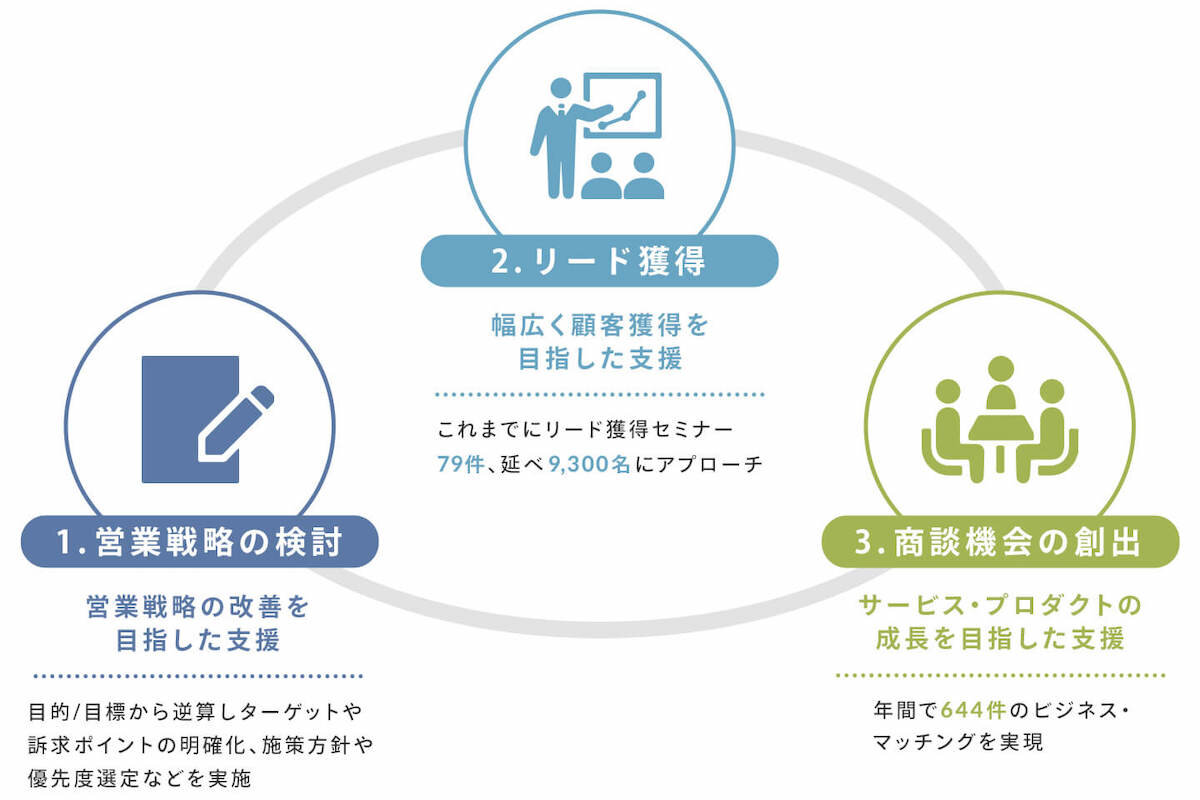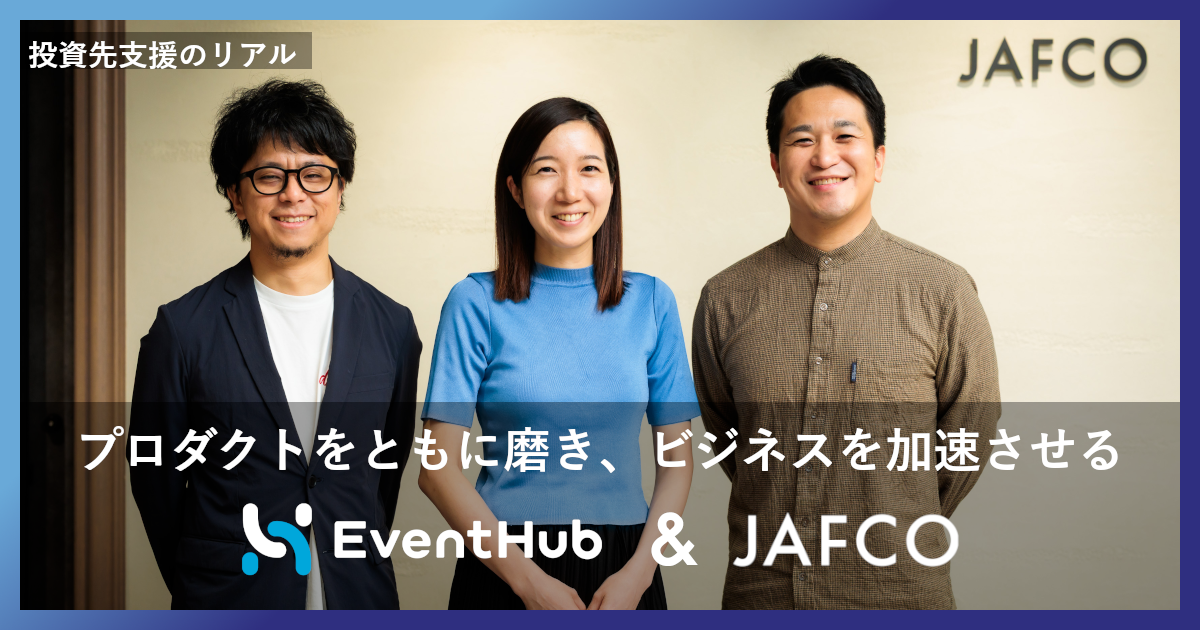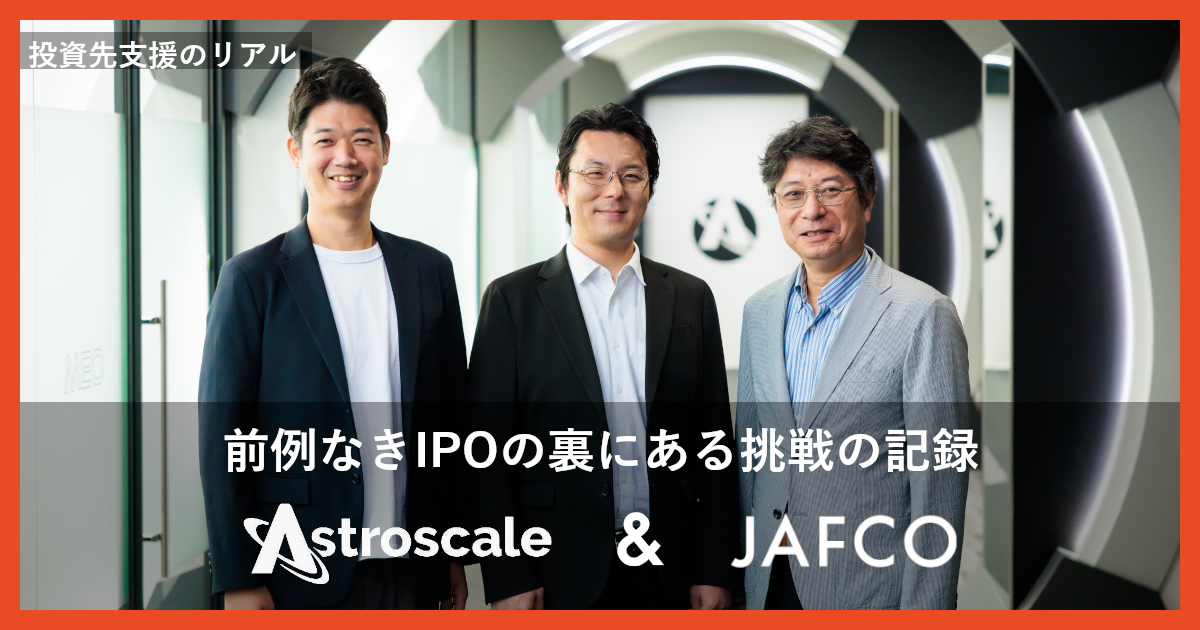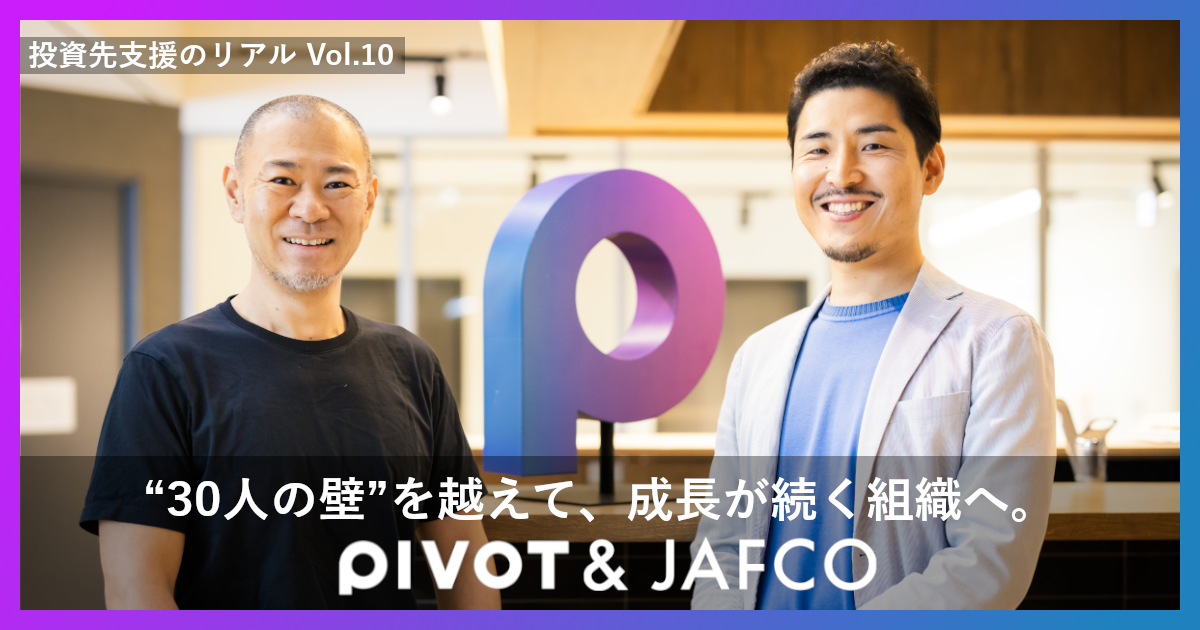
The Reality of Venture Support
The Basis of Support Is Creating Business Opportunities—How We Create That Crucial "First Meeting" for Startups
#Sales & Marketing Support

Startups face an endless stream of questions they need to solve.
"Is our product or service really in demand?" "How can a little-known startup even get in front of potential customers in the first place?"
Many startups struggle with customer acquisition, and it's not uncommon for them to fall short of their sales targets without finding a breakthrough.
JAFCO Group has long provided marketing and sales support to such startups. In this article, Keiichi Kurosaka, Atsushi Yamamoto, and Masanori Hashimoto from our Marketing & Sales Support team discuss the specific details of JAFCO's support for portfolio companies, including our achievements and how we work with them.
【Profiles】
Keiichi Kurosaka, Business Development Division, JAFCO Group Co., Ltd.
After graduating from the Faculty of Economics at Keio University, Mr. Kurosaka joined JAFCO in April 1986. After working in the Investment Planning Department, Listed Companies Department, Omiya Branch, and as a manager of the Head Office Investment Team (all former titles), he joined the current Sales & Marketing Support team in the Business Development Division in 2004. He is engaged in growth support for portfolio companies, such as customer development and capital and business alliances, and is also in charge of supporting large corporations in open innovation, new business development, CVC establishment and operation, and fund investment.
Atsushi Yamamoto, Business Development Division, JAFCO Group Co., Ltd.
Mr. Yamamoto was engaged in investment in startup companies in the Kyushu region for about five years at the Kyushu Branch (now the West Japan Branch). After that, he worked in the venture investment division at the head office before joining the Sales & Marketing Support team in the Business Development Division in 2020. Currently, he is in charge of supporting the growth of startups and promoting collaboration with large companies.
Masanori Hashimoto, Business Development Division, JAFCO Group Co., Ltd.
Mr. Hashimoto joined GREE, Inc. as a new graduate and engaged in alliance sales and operation consulting for its third-party platform. He later launched the sales division for an HR SaaS service at stmn, inc., developed company-wide solutions at Recruit Co., Ltd., and was involved in launching a joint venture and new business development at SoftBank Corp. before joining JAFCO in 2022.
Leveraging a Vast Network of Large Corporations to Support the "Creation of Opportunities"
From Sales Strategy Review to Lead Acquisition and Creating Business Meeting Opportunities
—First, please tell us more about the marketing and sales support that JAFCO provides.

Kurosaka: If I were to sum up our marketing and sales support in one phrase, it would be "building relationships" between our portfolio companies and large corporations. Specifically, we focus on activities like hosting webinars to create opportunities for people to learn about our portfolio companies and introducing them to the right large corporations from JAFCO's network. Webinars, in particular, were a measure we started during the COVID-19 pandemic, and it's common for nearly 100 people to attend a single event.
However, it's also a fact that many startups don't have a defined sales strategy or sufficient sales resources. In such cases, we work closely with them on foundational tasks, like developing a sales strategy and creating opportunities for business meetings.

A Network of Tens of Thousands of Large Corporations That Supports Relationship Building
—What are the factors that enable you to provide such a wide range of support, from company introductions and webinar hosting to sales strategy development and creating business opportunities?
Kurosaka: One factor is the network of several thousand large corporations we have built through our past activities in investment, fundraising, portfolio support, conferences, and webinars. This network is finely categorized by industry, business type, and company size, and our connections at the individual employee level extend to tens of thousands of people. This allows us to introduce the most suitable companies according to the portfolio company's situation.
Another factor, I believe, is our mindset of "putting entrepreneurs first." We always start by thinking, "What challenges is the company facing, and what is needed to solve them?" We don't just connect them to our network. Because we begin by considering what kind of support is truly necessary for the entrepreneur and the company, the nature of our support has inevitably become more diverse.
Verifying Sales Strategies, Hosting Webinars for Lead Generation, and Creating Business Meeting Opportunities
Verifying Sales Strategies from Multiple Scenarios
—Could you tell us about the specific details of your sales and marketing support?

Yamamoto: To reiterate, JAFCO's support can be divided into three main areas: "developing a sales strategy," "lead generation," and "creating business meeting opportunities with companies." The first thing we tackle is "verifying the sales strategy."
As a specific example, we start by forming hypotheses about which industries and business types would be the target customers for a startup's new product or service. For instance, in the case of a portfolio company with a remote customer service tool, we considered the compatibility of their service with various types of customer service scenarios and organized these into different sales approach patterns. Based on that, we introduced them to companies that matched each pattern.
Of course, every company has a different culture and approach to customer service, and we often get reactions that differ from our hypotheses. Still, we believe that having a broad sense of direction—knowing which type of customer service is most compatible with the product—leads to acquiring more customers more quickly.
Kurosaka: JAFCO didn't have all the right answers from the start; we've gradually evolved through trial and error. We've made hypotheses, tested them, and failed many times. We also increase the number of business meetings to improve the quality of our approach.
In a good way, we at JAFCO are also a "third party." This allows us to look at the positions of both the startup and the large corporation objectively and make improvements based on the "real feedback" we hear during post-sales follow-ups.
—Are these initiatives carried out at the request of the supported companies, or does JAFCO take the lead in proposing them?
Yamamoto: It's case-by-case, but JAFCO does both. Also, the requests from our portfolio companies and the strategies they should adopt vary widely, so we assess whether our network can provide value by seeing which parts of it fit each company's needs.
Hosting Lead Generation Webinars and Events for Both Portfolio Companies and Corporations
—After determining a direction through hypothesis testing, what steps do you take next?
Yamamoto: The next step is to create broad contact points with potential customer companies that align with that direction. Specifically, this involves hosting webinars and various other events.
JAFCO co-hosts webinars with our portfolio companies on a scale of about 100 attendees, where we mainly provide support for attracting participants. Startups that have just been established often face challenges with customer acquisition due to a lack of brand recognition. That's why we leverage JAFCO's network of large corporations to provide them with opportunities to become more widely known.
Additionally, webinars are effective even before the target audience is clearly defined. We hold multiple webinars with different themes and content, and based on the number of attendees and subsequent business meetings, we verify "which theme resonates the most." This process of refining hypotheses is another major feature. Some portfolio companies hold webinars continuously at a pace of once every one or two months, and JAFCO is often involved from the planning stage.
We also hold conferences aimed at fostering collaboration. While we often set up business meetings between our portfolio companies and large corporations, we found that there are few opportunities to discuss "challenges they want to solve through collaboration." Startups and large corporations, in particular, have different cultures and even use different language. That's why we believe that by having JAFCO stand in the middle, we can create true "open innovation" where the value of each party is connected.
.png)
—I see. Aiming for collaboration as well gives it a different appeal from other events.
Yamamoto: That's right. We share an overview of the participating companies in advance with the startups who will be pitching, and we also reach out to representatives from large corporations who are likely to be enthusiastic about promoting open innovation.
I think another characteristic of our company is that we constantly consider and implement necessary initiatives like various conferences and networking events based on the feedback from the pitching startups and participating companies.
Creating Business Meeting Opportunities with 100 Companies for a Product Launch
—Now, please tell us about the third initiative, "creating business meeting opportunities with companies."
Yamamoto: Even if you generate leads and have a clear sales strategy, it won't lead to increased sales if you can't create business meeting opportunities. That's where JAFCO utilizes its network of large corporations to "create business meeting opportunities." A great example of this is our support for WACUL INC., which provides DX for sales and marketing.
Initially, they were cautious about taking on external capital from a VC and were concerned about "whether we would support them as a true partner." It's true that with a VC like us, a power dynamic of investor and investee can easily form. It seems they were anxious about whether we would truly be a partner who would help them drive the business forward.
That's why we launched the "100 Company Introduction Campaign." As the name suggests, we decided to introduce 100 companies, set monthly targets, and attended their sales meetings to report on our progress. As a result, we successfully introduced 100 companies, from SMBs to large enterprises, in about a year. They have already received orders from several of them.
—One hundred companies... That level of commitment seems quite rare.
Yamamoto: I agree. Of course, conducting 100 business meetings would not have been possible without the hard work of the portfolio company's sales team. In that sense, I think this is a project that JAFCO could not have accomplished alone.
On the other hand, we didn't just introduce 100 companies. I believe the reason we achieved these results is that we proceeded while continuously considering and refining what the company wanted to achieve and what kind of customers they were looking for.
What Is Truly Meaningful Marketing and Sales Support for Portfolio Companies?
The Crucial "First Meeting" for Startups and Ventures
—Now, I'd like to ask Mr. Hashimoto, who previously worked at a JAFCO portfolio company and later joined JAFCO, about portfolio support from the startup's perspective.

Hashimoto: I used to work for a JAFCO portfolio company, and as a startup, we had no name recognition, so it was a real struggle just to set up the first business meetings. JAFCO's support came at just such a time, and they provided various kinds of assistance from the perspective of "building relationships." For example, they helped us secure meetings with companies we wanted to talk to, and on the other hand, they also introduced us to well-known companies we hadn't even considered.
For a startup, the launch phase is critical. If this phase doesn't go well, the business might not survive, or even if it does, its subsequent growth could be stunted, which can negatively impact the company's operations. That's why JAFCO's support during that launch phase was so valuable. The company at the time was able to use it as a flagship case study, and it was a great experience for me personally as well.
In my years of being involved in sales and marketing support, I've come to see that every portfolio company faces similar challenges to the ones I experienced.
Even if you have a great team and a great service, it's a struggle to even get a business meeting without name recognition or a track record. In such situations, JAFCO can step in and move the conversation forward by explaining why we invested in the company and what problems it can solve for the potential customer.
Through more than 50 years of investment activity, our Business Development Division members have built relationships with people at various companies. Many of them are willing to listen if it's a JAFCO portfolio company, which has made me realize anew how trusted JAFCO is.
—Could you tell us about the differences between JAFCO and other VCs in terms of support?
Hashimoto: JAFCO has a dedicated department called the Business Development Division and a network of several thousand large corporations built over 50 years of activity, which allows us to introduce a wide range of companies quickly. This makes it possible to verify PMF (Product-Market Fit) from multiple perspectives, connect companies with key people on the corporate side when they have financing needs, and provide an environment that leads to further value enhancement and the creation of new business.
The Future of Marketing and Sales Support

—Finally, please tell us about the future of JAFCO's marketing and sales support.
Kurosaka: At the core of our philosophy is a "respect for entrepreneurs." That's why we don't want to be a presence that just pays lip service to being "for our portfolio companies." We want to value working together with them to enhance their corporate value and create new business. We will continue to evolve our marketing and sales support initiatives while always thinking, "What is most important for our portfolio companies?"
Yamamoto: Hypothesis testing in sales and marketing for our portfolio companies is an area where it's difficult to ensure reproducibility, as the situation differs in each case. That's why it's important for us not to let the practical knowledge gained through our support remain a one-off experience, but to systematize and verbalize it so it can be passed on to the next support initiative. By accumulating this knowledge, we can present our portfolio companies with effective options that go beyond mere advice. I believe this will ultimately lead to improving the quality of JAFCO's support, and I want to continue this process of trial and error.
Hashimoto: In the future, we will promote initiatives to broaden and deepen the collaboration between our portfolio companies and large corporations. We are considering the use of AI and systematizing measures that combine both online and offline approaches. As a bridge connecting portfolio companies and large corporations, we want to contribute to the revitalization of the startup ecosystem.
Related Articles
-

The Reality of Venture Support
Polishing Products Together and Accelerating the Business: EventHub’s Challenge, Backed by JAFCO’s User-Centric Support
-

The Reality of Venture Support
True Partnership in Uncharted Territory: The Challenge Behind the World’s First Space Debris Removal and the Journey to the IPO
-

The Reality of Venture Support
How to Apply "Leverage" to Both People and the Organization: The Role of HR Support in Enhancing Portfolio Company Value
-

The Reality of Venture Support
An IPO Is Just a "Milestone": Behind the Scenes of Back-Office Support Aimed at Increasing Portfolio Company Value
-

The Reality of Venture Support
Beyond the "30-Person Wall": How Business Media PIVOT Partnered with JAFCO to Strengthen Management and Reshape Their Organization, Guided by a "Sherpa-like" Presence Aiming for Greater Heights